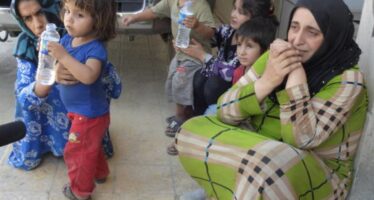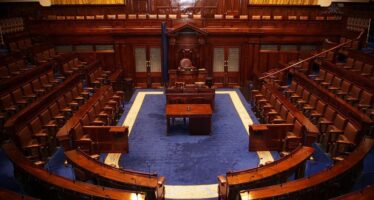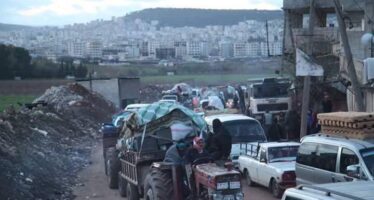The challenge of Democratic Autonomy
![]()

The Democratic Society Congress put on the table the challenge of Democratic Autonomy: living together in the twentyfirst century
The Democratic Society Congress (DTK) has met in Diyarbakir for its two days congress. Over 800 people joined the meeting at the BDP (Peace and Democracy Party) building.
The Congress developed while outside serious events happened. On the one hand the continuous aggression by the Iranian army which aims to “eradicate” the Kurdish guerrillas from Kandil mountains ignoring international law as far as sovereignity is concerned.
So for the past two weeks Iran has been bombing villages in the Kurdistan Federal Region without anyone protesting against it. Indeed Turkey and the United States are partner in this aggression and they are sharing intelligence with Iran. Turkish troops have been deployed to the border, near the city of Semdinli and are waiting to see which way the operation will turn.
At the same time the Turkish army has remained without heads. In a sudden but not completely unexpected move the Turkish General staff, I??k Ko?aner, and the air, navy and land commanders resigned. The move came ahead of an important meeting in which new generals will be nominated. The army wanted some generals indicted under the Ergenekon investigation to be nominated. The government was not that keen. Indeed Prime Minister Erdogan moved swiftly to resolve the crisis and appointed Gendarmerie General Commander Necdet Özel Commander of the Army and Deputy Chief of General Staff.
But the DTK congress was held also while in all of the Kurdish region operations, arrests, attacks are going on. Military operations intensify in the past weeks. So did detentions. And there is fear of a new imminent political operation.
Indeed at the Congress many delegates stated that what has been going on since the local election on March 2009 amounts to nothing less than a political genocide. Thousands of politicians, activists, party members, civil society association members have been arrested and are under trial. Tomorrow, Tuesday, there will be a new hearing of the so called KCK (Kurdish Communities Confederation) trial. Detentions continue and indeed after the general elections of 12 June six democratically elected MPs are still in prison. Hatip Dicle, not only remains in prison but in an incredibly undemocratic move, has been denied his mandate. He has been replaced by the AKP (the ruling Justice and Development Party) candidate for Diyarbakir and imposed as deputy, with total disregard for people’s choice.
The Congress has addressed many issues. The Iranian aggression was discussed at lenght, and so was the latest reflections by Kurdish leader Abdullah Ocalan. In this context the assembly decided to launch an inititiative for the freedom of Ocalan, who need to be able to act for peace in an adequate environment.
Also on the agenda was the need for a national conference. This was an idea first launched last year and then postponed both for the elections in iraq and for the election in Turkey. In their last visit to Erbil, though, the BDP representatives have underlined the importance and urgency of such a conference. The plan is to held it before the end of 2011. Events in Turkey, Iran, Syria and Iraq as well underline how urgent it is to have such a conference.
The core of the congress debate though was the Democratic Autonomy. Announced on 14 July, the project was discussed at lenght at the weekend by delegates. On 14 July Aysel Tugluk MP said: “We are announcing our power and will to govern ourselves. Democratic autonomy is not for the Kurdish people alone, but is rather a model for a solution that will allow all of Turkey’s peoples to freely express their beliefs and culture.”
At the weekend the concept of Democratic Autonomy was further explicitated. “Democratic Autonomy is the sociology of freedom, it develops a new and free life against the monolithic, dominant and totalitarian paradigm of the capitalist modernity. It is based on the paradigm of the 21st century; unity of differences, the diversity’s right for autonomy, self-governance of all social groups and the right and philosophy to provide defense and freedom. The spirit of the time is in the act ofa rebellion on this axis”.
In this context it was stated in the final document that “Democratic Autonomy, which is a unity in diversity, never means to build up a power against the power and the state. It means an organization of the society out of the state against being socialized and nationalized, in other words it means less state and more society. In this sense, democratic autonomy is in a process of a continuous development and construction just like a living organism. With a method of bilateral law, it designs and secures the state which will block its free development and legal structure”.
From this point of view, the declaration of Democratic Autonomy has to be seen as “a declaration of intention and the works to build democratic autonomy is to build up the self-governance of sociality. The Kurdish people base their political status upon the freedom perspective described below. There exist an attitude and attack as if Kurds and the DTK have declared and a separate land. Discussions are intended to be distorted to another course. It is known very well that this is not a declaration of establishing a state or being separated”.
DTK spokesperson Cemal Co?kun remarked that “It is known only too well that Kurds seek a common living. To express the situation once again in a very clear and open way; we have made the declaration of our social democratic solution model in the face of the statalist mentality and structures that impose a deadlock on all issues, on the Kurdish problem in particular. We project the autonomy for the Kurdish people and all peoples. The democratic autonomy is the status that Kurdish people have determined for themselves in the geography of Kurdistan. All the developments lived after the declaration have showed that the declaration of Democratic Autonomy is a very historical step and decision. This decision of the Kurdish people and their the most legitimate and comprehensive enactment DTK has initiated a new process and invited everyone to show its true colors in this process. In addition, works will be continued to build and institutionalize the democratic autonomy regardless of the approaches and responses to this declaration of intention. The struggle will continue to include this solution in the new constitution to be prepared.”
The work in the coming weeks will be to trying theory into practice. To do so the DTK is also exploring the different form of autonomy present around Europe. In addition to that the DTK congress has listed a five point proposal to facilitate the beginning of a dialogue leading to a peaceful solution of the Kurdish question.
So far no reactions have been detected from the government, ministers or other parties. It remains to be seen whether the government will be ready and willing to stand up to the political, ethical and philosophical challenge posed by the Democratic Autonomy project.
Related Articles
Civilians rescued in Raqqa tell of the cruelty of ISIS
![]()
SDF forces are struggling to rescue countless of civilians trapped in the ISIS-run city of Raqqa. Rescue operations are made
Comisiones Obreras Catalunya denuncia pasividad internacional frente la ocupación de Afrin
![]()
Comisiones Obreras Catalunya condena la ocupación turca de Afrin y pide a la comunidad internacional, sobre todo la Union Europea




